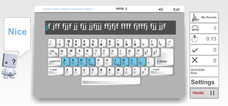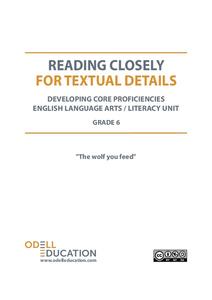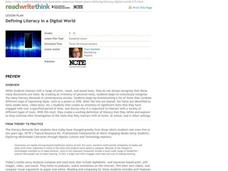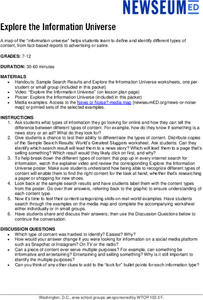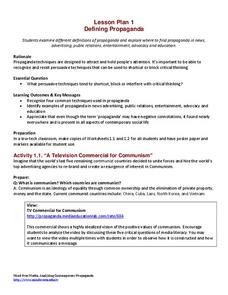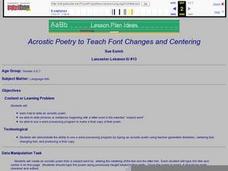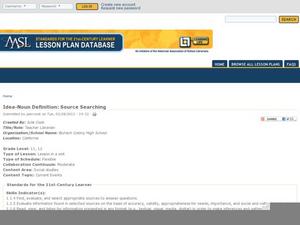Curated OER
In-Text Citation
Wow! Here's a comprehensive look at the world of plagiarism. Types of plagiarism are defined, examples are shown, and in-text examples are highlighted. Being 75 slides long, this presentation is slightly overwhelming. Consider dividing...
Sensetype
How to Type: Keyboarding Tutorials
Become an efficient typist who can easily perform online research, type assessments, and take online exams. With the link to a free keyboarding interactive website, any child will become a professional with their keyboarding skills.
Odell Education
Reading Closely for Textual Details: Grade 6
Close reading doesn't mean to literally read text close to your face, but rather to pay attention to particular details in order to develop a deep and purposeful understanding of text. The first part of a five-part resource provides an...
Curated OER
Altering Text Size, Color, and Font
Students explore computer text. In this word processing and computer activity, students practice changing color, font, and the size of their text with guided instruction from the teacher.
ReadWriteThink
Defining Literacy in a Digital World
What skills are necessary to interact with different types of text? Twenty-first century learners live in a digital world and must develop a whole new set of skills to develop media literacy. Class members engage in a series of...
National Council of Teachers of English
Timelines and Texts: Motivating Students to Read Nonfiction
With the emphasis on incorporating more nonfiction in language arts classes the question arises about how to design activities that motivate kids to engage with informational text. How about an assignment that asks class members to...
Ontario
Critical Literacy—Media Texts
Media texts convey both overt and implied messages. As part of their study of media, class members analyze the language, form, techniques, and aesthetics in a variety of media texts.
Curated OER
Library Lesson Plan
Explain the differences between fiction and non-fiction and the characteristics of a biography. Learners analyze three pieces of literature on the same topic to determine which is fiction and which is non-fiction. In the end, relate the...
Roseburg Public Schools
Library Skills and Literature
The library is such a valuable resource for kids of all ages. Help elementary readers learn all about parts of the library, text features for both fiction and nonfiction text, and different ways to find books that they want to read.
EngageNY
Finding Relevant Information and Asking Research Questions: The Benefits of Video Games
Video games may not be so bad after all. As scholars read the text "The Many Benefits, for Kids, of Playing Video Games," they summarize the gist in their researchers' notebooks. Next, pupils draft supporting research questions based on...
EngageNY
Contrasting Evidence: “Games Can Make a Better World” and “Video Games Benefit Children, Study Finds”
Anecdotes, analogies, testimonies, statistics. The most powerful arguments rely on multiple types of evidence. Scholars explore the topic as they read contrasting evidence about the benefits of video games. They complete Venn diagrams to...
Name Parts of a Computer and Terms for Interface Elements
Familiarize your young learners with the parts of a computer and some basic key terms relating to technology. As the teacher demonstrates using an LCD projector, class members practice moving a mouse, opening the Internet, typing in a...
Curated OER
Technopoet - Poetry Lesson Plans
Practice word processing while writing different types of poems. First, elementary and middle schoolers use Word templates to write poetry. They use rhyming and descriptive words as they work with clipart, text wrapping, and picture...
Open Oregon Educational Resources
Technical Writing
Hate having to look in multiple sources to find information?Technical Writing contains all information in one book! The book covers everything from defining technical writing, giving examples of technical writing, and tips for creating...
WeTransfer BV
Paper by FiftyThree
There is no such thing as someone who is not artistic when using this app. In fact, this is the type of app that makes you want to go out and buy a tablet computer. Whether you have a creative lesson planned, or just need a place to take...
Qrayon
Inkflow: Think Visually!
Save trees! Save graphite! Save ink! Go paperless! Make a list, mindmap, sketch an idea. Import, scale, rotate, and add text to images. Save content into books and share your creations. All this and more is yours with a free visual...
EngageNY
Gathering Information about Water Management: Assessing and Reading Internet Sources, Day 3
Water is life! Using the informative resource, scholars first read two informational articles about water management in agriculture. Then, they use a Venn diagram to contrast the different types of evidence authors use to support a...
EngageNY
Analyzing the Features of a Newspaper Article
There's more to newspaper articles than meets the eye. Scholars learn the different features of a newspaper article, including headline, byline, subheadings, etc. Pupils circle the features in an article as the teacher discusses their...
Newseum
Explore the Information Universe
Distinguishing among different types of content when conducting online searches can be a challenge. An informative resource helps researchers identify different types of content, from fact-based reports to ads, from propaganda to satire....
Media Education Lab
Defining Propaganda
21st century learners live in a media world. Help them develop the skills they need to be able to analyze the barrage of propaganda they face daily, with a resource that introduces them to the type of persuasive appeals found in news,...
Newspaper Association of America
The News
Young journalists learn about topics such as newspaper ethics, parts of a newspaper, credible sources, and different types of articles. The lesson empowers individuals and gives them the capability to express their voices through the...
Curated OER
Formatting Fun
Launch this instructional activity by saving the provided Formatting Fun template on your classroom or library computers. Young learners can then practice formatting basics for use in writing activities. Exercises include practice in...
Curated OER
Acrostic Poetry to Teach Font Changes and Centering
Students engage in a discussion about how to write an acrostic poem. They demonstate the ability to use a word processor by typing an acrostic poem by following instructions. Word processing skills such as, centering text, changing font,...
Curated OER
Idea-Noun Definition: Source Searching
A great idea for showing language arts pupils the universality of themes, even in the real world! Have class members choose an idea-noun (peace, justice, war, love, etc.) at the beginning of the year or semester. They complete weekly...
Other popular searches
- Text Types
- Types of Text Organization
- Types of Text Structures
- Types Text Organization
- Different Types of Text
- Expositions Text Types
- 4 Types of Text
- Writing Text Types
- Matching Types of Text
- Esl Text Types



